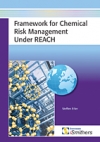Framework for Chemical Risk Management Under REACH - iSmithers-Rapra

Since 2008, the EU system for the Registration, Evaluation and Authorization of Chemicals (REACH) has begun impacting companies across the world. Today, efficient and effective implementation of REACH continues to depend on the inter-action of Member State regulators during EU decision-making. This is the result of past political debates surrounding the legislation being narrowly focused on mechanisms for conducting hazard assessments. To facilitate EU decision-making, Framework for Chemical Risk Management under REACH presents a possible framework for risk management under REACH.
As a first step, the regulatory approaches of four prominent countries in EU decision-making are analysed and compared: France, Germany, Sweden and the UK. On the basis of 36 interviews conducted with regulators and stakeholder representatives, the study examines how these Member States influence EU chemical regulation, and vice versa. From these findings, the research concludes that a framework for EU decision-making must incorporate hazard, technical and risk-benefit approaches to risk management. As a final step, the potential operability of the proposed framework is tested using risk assessment data for 33 chemicals subject to regulatory review. Whether elements of the framework are adopted by the European Chemicals Agency, the European Commission and Member States remains to be seen.
Click here for further information
Terms
While we only use edited and approved content for Azthena
answers, it may on occasions provide incorrect responses.
Please confirm any data provided with the related suppliers or
authors. We do not provide medical advice, if you search for
medical information you must always consult a medical
professional before acting on any information provided.
Your questions, but not your email details will be shared with
OpenAI and retained for 30 days in accordance with their
privacy principles.
Please do not ask questions that use sensitive or confidential
information.
Read the full Terms & Conditions.